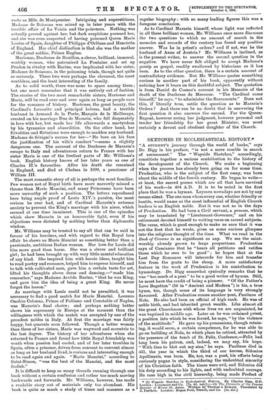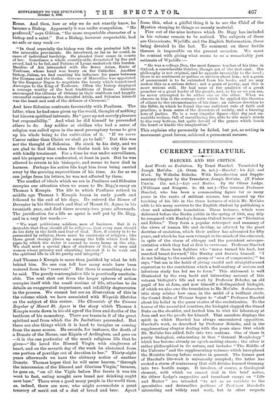SKETCHES IN ECCLESIASTICAL HISTORY.* "A stcrpEwr's journey through the world
of books," says Dr. Bigg in his preface, "is not a mere ramble in search of amusement." The "Wayside Sketches," accordingly, constitute together a serious contribution to the history of the development of the Church. We make a beginning when the process has already been going on for some time. Prudentius, who is the subject of the first essay, was born about the middle of the fourth century. He began to write— at least, the sacred poems which are all that have survived of his work—in 404 A.D. It is to be noted in the first place that he was a layman. Laymen nowadays are not by any means silent. The one man whom every one, whether friendly or hostile, would name as the most influential of English Church leaders is an English noble. But it was not so in the days of Prudentius. He had been a Civil servant, a praeses, whieh may be translated by "Lieutenant-Governor," and on his• retirement devoted himself to writing verse on sacred subjects. The verse, which is good enough to make us sure that it was not the first that he wrote, gives us some curious glimpses into the religious thought of the time. What we read in the Book of Crowns is as significant as any. We see the saint. worship already grown to large proportions. Prudentius says of Cassianus that he "hears all petitions and ratifies those which he sees to be good" ; be hopes that at the Last Day Romanus will intercede for him and transfer him from the goats to the sheep. A more satisfactory feature in the work of Prudentius is his contribution to hymnology. Dr. Bigg somewhat cynically remarks that he was "too much of a poet" to be a good writer of hymns. Still, he must have the credit of being a pioneer. "Of the Father's Love Begotten" (56 in "Ancient and Modern ") is his, a true hymn, too, though some of its language is very strongly flavoured. After Prudentius comes another poet, Paulinus of Nola. He also had been an official of high rank. Re was of noble birth, and had inherited great wealth. Like almost all the great Churchmen with whose lives we are acquainted, he was baptised in middle age. Later on be was ordained priest, a position into which he was forced, he says, "by the violence of the multitude." He gave up his possessions, though retain- ing, it would seem, a certain competence, for he was able to go on building at Nola, to which place he retired, attracted by the presence of the tomb of St. Felix, Confessor,—Felix had long been his patron, and, indeed, we may say, his hope. "With thee to blot out my sins," he says. Paulinus died in 431, the year in which the third of our heroes, Sidoniue Apollinaris, was born. He, too, was a poet, his efforts being curiously pagan in style, considering the undoubted sincerity of his Christian faith. The times were evil, and Sidonius did his duty according to his lights, and with undoubted courage. He rose high in the civil hierarchy, being made Prefect of • * (1) Wayside Sketches in Ecclesiastical History. By Charles Bigg, London : Longmans and Co. ['is. 6d. net.]—(2) The Chronicle of the Canons Regular of Mount St. Agnes. Written by Thomas h Keinpis. Translated by J. Parthen. London: Began raid, Trench, and Co. [5s. net] Borne. And then, how or why we do not exactly know, he became a Bishop. Apparently it was under compulsion. "He preferred," says Gibbon, "the more respectable character of a bishop and a saint." But a Bishop, however respectable, had no safe or easy work :—
" In Gaul especially the bishop was the sole protector left to the miserable provincials. He interfered, as far as he could, in cases of individual hardship. He pleaded their cause in courts of law. Sometimes a whole country-side, devastated by fire and sword, had to be fed, and Patiens of Lyons undertook this burdete Basilins of Aix interceded with the fierce Arian, Euric of Toulouse, whose hand was heavy on the Catholics. Another bishop, Julian, we find exerting his influence for peace between the Romans and the Goths. Grtecus of Marseilles was appointed by the Emperor Nepos to negotiate the treaty which transferred Auvergne to the King of Toulouse. Often the bishop displayed a courage worthy of the best traditions of Rome. Anianus encouraged the citizens of Orleans in their stubborn and happily successful resistance to the dreadful Attila, and Sidonius himself was the heart and soul of the defence of Clermont."
And here Sidonius contrasts favourably with Paulintts. The latter, when he had once given up the world, thought of nothing but his own spiritual interests. He " gave up not merelypleasure but responsibility." And what he did himself he persuaded others to do. Any soldier or civilian who had a sense of religion was called upon in the most peremptory terms to give up his whole being to the cultivation of it. "If we Serve Caesar rather than Christ we shall go to hell." But this was not the thought of Sidonius. He stuck to his duty, and we
are glad to find that when the Goths took his city he met with kindly treatment. For a time he was under surveillance, and his property was confiscated, at least in part. But he was allowed to return to his bishopric, and seems to have died in harness. Perhaps his active life kept hint from being carried away by the growing superstitions of his time. As far as we can judge from his letters, he was not affected by them.
The conflict of ideals which we see in Paulinus and Sidonius
occupies our attention when we come to Dr. Bigg's essay on Thomas it Kempis. The life to which Paulinus retired in middle age Thomas a Kerepis began in early youth and followed to the end of his days. He entered the House of Deventer in his thirteenth and that of Mount St. Agnes in his twentieth year, and died there seventy-two years afterwards. The justification for a life so spent is well put by Dr. Bigg, and in a very few words :— " We want politicians, soldiers, men of business. But it is desirable that they should all be religious, that every man should do his duty in the faith and fear of God. Now, if society is to be permeated by religion, there must be reservoirs of religion ; like those great storage places up among the hills which feed the pipes by which the water is carried to every home in the city. We shall need a special class of students of God, of men and women whose primary and absorbing interest it is to work out the spiritual life in all its purity and integrity."
And Thomas h Kemple is more than justified by what he left behind him. No one can tell how many souls have been
watered from his "reservoir." But there is something else to
be said. The purely contemplative life is practically unattain- able. The soul shut out from the larger spheres of action occupies itself with the small routine of life, attaches to its details an exaggerated importance, and infallibly degenerates in the process. We cannot but see an illustration of this in the volume which we have associated with Wayside Sketches as the subject of this review.. The Chronicle of the Canons Regular of Mount St. Agnes is the story which Thomas b. Kern pis wrote down in his old age of the lives and deaths of the brethren of his monastery. There are traces in it of the great spiritual soul from which the De Intitatione proceeded. But there are also things which it is hard to imagine as coming
from the same source. He records, for instance, the death of a Donate of the House, one Riquin. of Ardinghen, and goes on —it is the one particular of the man's religious life that he gives—" He loved the Blessed Virgin with singleness of
heart, and on the seventh day of the week he abstained from one portion of porridge out of devotion to her." Thirty-eight years afterwards we have the obituary notice of another Donate. Thomas hopes that he will enter heaven, "through the intercession of the Blessed and Glorious Virgin," because, he goes on, "on all the Vigils before Her feasts it was his wont to fast, eating nought save bread nor drinking aught save beer." There were a good many people in the world then, as, indeed, there are now, who might accumulate a great treasury of merit out of a diet of bread and beer. Apart from this, what a pitiful thing it is to see the Chief of the Mystics stooping to things so meanly material.
Five out of the nine lectures which Dr. Bigg has included in his volume remain to be noticed. The subjects of these are Grosseteste, Wycliffe, and the English Reformation, three being devoted to the last. To comment on these fertile themes is impossible on the present occasion. We must be content with giving what seems to us a remarkably just estimate of Wycliffe :— "He was a college Don, the most famous teacher of his time in Oxford, a considerable thinker, though not of the first rank. His philosophy is not original, and he appeals invariably to the bead ; there is no sentiment or pathos or unction about him; not a grain of amusement is to be extracted from his books, and we may reckon this as a serious defect ; not a grain of poetry, and this is more serious still. He had none of the qualities of a great preacher or a great leader of the people, and, so far as we can see, he never attempted to be either one or the other. What we observe in him is the courage with which he applied the theories of others to the circumstances of his time ; an intense devotion to the Bible, in which he found the one sufficient rule of faith and practice ; a keen sense of the disorders of society, and a burning love of justice. He is a very singular figure—this dry and un- sociable recluse, full of smouldering fire, able to stir men's minds to the very bottom, but quite devoid of the graces which touch the heart or kindle the imagination."
This explains why personally he failed, but yet, as setting in movement great forces, achieved a permanent success.































































 Previous page
Previous page